
by Ria Olivier | Dec 19, 2025 | Uncategorised
The Marion 82 Overwintering Team newsletter is now available. Based on Marion Island as part of the South African National Antarctic Programme (SANAP), the Marion 82 team shares a vivid snapshot of life and work on the island.
 This edition features a warm welcome and introduction from Mndeni Hlatshwayo (Team Leader & Medical Orderly) and Andile Kuzwayo (Editor-in-Chief), followed by a “Meet the Team” section introducing the overwintering members. Richly illustrated with striking photographs, the newsletter also highlights the team’s daily activities, captures the unique island environment, and presents insightful weather statistics that reflect the challenging conditions of Marion Island. Together, these stories offer an engaging look at the people, science, and experiences shaping the Marion 82 overwintering year.
This edition features a warm welcome and introduction from Mndeni Hlatshwayo (Team Leader & Medical Orderly) and Andile Kuzwayo (Editor-in-Chief), followed by a “Meet the Team” section introducing the overwintering members. Richly illustrated with striking photographs, the newsletter also highlights the team’s daily activities, captures the unique island environment, and presents insightful weather statistics that reflect the challenging conditions of Marion Island. Together, these stories offer an engaging look at the people, science, and experiences shaping the Marion 82 overwintering year.
Download Newsletter here
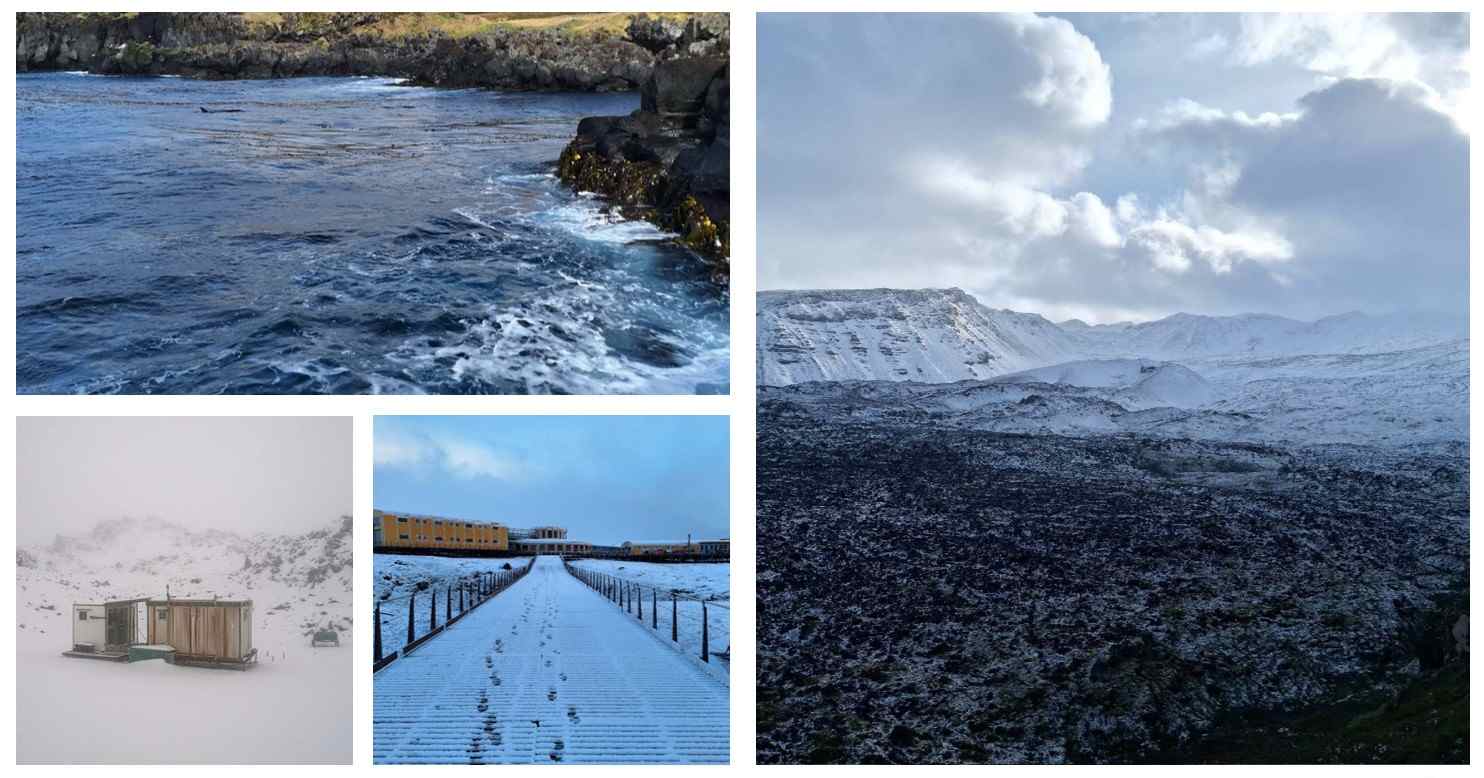

by Ria Olivier | Dec 15, 2025 | Uncategorised
The South African National Antarctic Programme (SANAP) is proud to announce a striking new science–art installation on Cape Town’s iconic Sea Point Promenade: “Pole to Promenade”, a public photo exhibition, alongside “Drifters: The Invisible Forest”, a vibrant mural celebrating the unseen world of phytoplankton. Together, these installations transform one of South Africa’s most visited public spaces into an open-air gateway to the Southern Ocean and Antarctic region.
This Science–Art project was initiated by Dr Sandy Thomalla, Research Group Leader of the Southern Ocean Carbon–Climate Observatory (SOCCO) at the CSIR, and realised in collaboration with Ria Olivier of the Antarctic Legacy of South Africa (Stellenbosch University). It reflects SANAP’s commitment not only to world-class polar research, but also to sharing that knowledge widely — beyond academic journals and into everyday life.
Art as a Bridge to Science: Art has a unique power: it invites people to pause, to look closely, and to feel curious. In that moment of engagement, complex scientific ideas can become accessible, memorable, and meaningful. Much of SANAP’s work takes place in remote, extreme environments that most people will never experience first-hand. Through creative expression, art becomes a bridge between science and society — translating data, models, and observations into stories that resonate emotionally. Globally, arts and culture are increasingly recognised as essential partners in science communication, particularly in areas such as climate change and ocean literacy. By combining visual art, imagery, and storytelling, Pole to Promenade aims to deepen public understanding of why polar research matters, why national investment in this work is vital, and how the Antarctic region and Southern Ocean are tightly connected to everyday life in South Africa.
 Drifters: The Invisible Forest: At the heart of the installation is Drifters: The Invisible Forest, a large-scale mural painted by Cape Town artist Joh Del on one of the Sea Point promenade’s ablution blocks. The mural celebrates phytoplankton — microscopic, single-celled organisms that drift through the sunlit surface of the ocean. Though invisible to the naked eye, phytoplankton are foundational to life on Earth. Like plants on land, they photosynthesise, forming the base of marine food webs. They are responsible for producing roughly half of the oxygen we breathe and play a critical role in regulating Earth’s climate by absorbing vast amounts of carbon dioxide through the biological carbon pump. Their seasonal blooms drive ocean productivity, influence global carbon cycles, and ultimately support marine ecosystems and human food security. Structurally diverse and visually striking, phytoplankton are also unexpectedly beautiful. The mural brings this hidden world to life through flowing forms and vivid colour, inviting passers-by to appreciate both the aesthetic wonder and ecological importance of these tiny ocean drifters.
Drifters: The Invisible Forest: At the heart of the installation is Drifters: The Invisible Forest, a large-scale mural painted by Cape Town artist Joh Del on one of the Sea Point promenade’s ablution blocks. The mural celebrates phytoplankton — microscopic, single-celled organisms that drift through the sunlit surface of the ocean. Though invisible to the naked eye, phytoplankton are foundational to life on Earth. Like plants on land, they photosynthesise, forming the base of marine food webs. They are responsible for producing roughly half of the oxygen we breathe and play a critical role in regulating Earth’s climate by absorbing vast amounts of carbon dioxide through the biological carbon pump. Their seasonal blooms drive ocean productivity, influence global carbon cycles, and ultimately support marine ecosystems and human food security. Structurally diverse and visually striking, phytoplankton are also unexpectedly beautiful. The mural brings this hidden world to life through flowing forms and vivid colour, inviting passers-by to appreciate both the aesthetic wonder and ecological importance of these tiny ocean drifters.
 Pole to Promenade: An Outdoor Image Exhibition – Alongside the mural, the Pole to Promenade image exhibition features more than 20 powerful photographs and data visualisations captured by South African polar researchers. These images offer a rare glimpse into the remote and fragile environments of the Southern Ocean and Antarctic region — places central to global climate regulation, yet far removed from daily experience. The exhibition blends field photography, satellite imagery, microscopic views, and creative data visualisations to showcase the breadth of SANAP-supported research. Together, the images highlight South Africa’s long-standing leadership in polar science and underscore the importance of sustained research in understanding climate change, ocean processes, and Earth system dynamics. A huge thank you to all the contributors of these images
Pole to Promenade: An Outdoor Image Exhibition – Alongside the mural, the Pole to Promenade image exhibition features more than 20 powerful photographs and data visualisations captured by South African polar researchers. These images offer a rare glimpse into the remote and fragile environments of the Southern Ocean and Antarctic region — places central to global climate regulation, yet far removed from daily experience. The exhibition blends field photography, satellite imagery, microscopic views, and creative data visualisations to showcase the breadth of SANAP-supported research. Together, the images highlight South Africa’s long-standing leadership in polar science and underscore the importance of sustained research in understanding climate change, ocean processes, and Earth system dynamics. A huge thank you to all the contributors of these images
As Dr Sandy Thomalla writes: “The Sea Point Promenade in Cape Town has become a portal to the Southern Ocean, thanks to a new science–art installation celebrating South Africa’s leadership in polar research.”
A Living, Learning Space for All – Both installations will remain on the Sea Point Promenade for at least two years, creating a free, open-access encounter with polar science for locals and visitors alike. With more than a million people visiting the promenade each year, the site offers a rare opportunity to reach audiences from all walks of life — outside the walls of museums, galleries, or universities. An official launch is planned for early 2026, which will include a dedicated workshop with learners from schools across the Western Cape, reinforcing SANAP’s commitment to education, inspiration, and the next generation of scientists. In the meantime, SANAP warmly invites the public to explore the installations, engage with the stories they tell, and learn more about South Africa’s vital role in Antarctic and Southern Ocean research.
Why It Matters – The Southern Ocean absorbs around 50% of the ocean’s carbon dioxide uptake and 75% of the excess heat generated by human activities, acting as a crucial buffer against climate change. Understanding how this system works — and how it is changing — is central to SANAP’s mission. By bringing this science into public spaces through art, Pole to Promenade helps foster awareness, appreciation, and care for our shared environment.
CLICK HERE for more information on the project
We invite everyone walking the promenade to pause, look closer, and let this journey from the Pole to the Promenade spark curiosity about our planet — and South Africa’s role in protecting its future.


by Ria Olivier | Aug 5, 2025 | Jobs, Marion Island, Ornithology, Overwintering Team, Uncategorised
Now Recruiting: Field Birder Assistants for Marion Island 2026–2027!
Do you dream of working with seabirds in one of the most remote and ecologically important locations on Earth? The South African National Antarctic Programme (SANAP) is calling for two passionate and resilient individuals to join a pioneering research expedition to Marion Island as Field Birder Assistants for the 2026–2027 overwintering team.
ADVERTISEMENT
Successful candidates will spend over a year (April 2026 – May 2027) stationed on Marion Island, a sub-Antarctic territory and vital breeding ground for seabirds and marine mammals. This unique opportunity offers a once-in-a-lifetime chance to contribute to long-term conservation efforts and seabird monitoring in a truly wild and isolated environment.
CLOSING DATE 25 AUGUST 2025
As a Field Birder Assistant, your role will include:
-
Conducting biological research, fieldwork, and monitoring activities in line with detailed work plans developed by the project managers.
-
Making independent decisions in the field regarding work priorities and protocols, often in challenging and unpredictable conditions.
-
Handling seabirds, including both adults and chicks, with empathy, care, and attention to minimizing stress or harm to the animals.
-
Maintaining accurate records and databases, ensuring all data is well-organized and up to date.
-
Reporting regularly to project managers and providing progress updates on fieldwork and research activities.

by Ria Olivier | Jul 26, 2025 | Announcement, Jobs, Overwintering Team, Uncategorised
🌍 Join the 2025–2027 Overwintering Team at SANAE IV Station, Antarctica!
 The South African National Antarctic Programme (SANAP) is calling on individuals to apply for positions at the SANAE IV Station in Antarctica for the 2025–2027 overwintering season. This is a rare opportunity to live and work in one of the most remote and extreme environments on Earth, supporting essential scientific research and operations.
The South African National Antarctic Programme (SANAP) is calling on individuals to apply for positions at the SANAE IV Station in Antarctica for the 2025–2027 overwintering season. This is a rare opportunity to live and work in one of the most remote and extreme environments on Earth, supporting essential scientific research and operations.
🧊 Positions Available:
-
Senior Meteorological Technician
-
Diesel Mechanic
-
Mechanical Engineer
-
Medical Doctor
-
Electro-Mechanical Technician
-
Communications Engineer
-
Instrumentation Technician
📅 Closing Date: 18 August 2025 🔗 Apply now and learn more:
Job Advertisements
📍 Successful candidates will undergo pre-departure training and spend approximately 14 months in Antarctica, contributing to critical support and science at SANAE IV.

by Ria Olivier | Jun 8, 2025 | International Days, Oceanography, Uncategorised
One Ocean, One Climate, One Future – Together
 On 8 June 2025, the SANAP community celebrates World Oceans Day under the powerful theme: One Ocean, One Climate, One Future – Together. At the heart of this theme lies a call to protect our blue planet through collective research, and deepened understanding of the critical role our oceans play in shaping the Earth’s climate and supporting life.
On 8 June 2025, the SANAP community celebrates World Oceans Day under the powerful theme: One Ocean, One Climate, One Future – Together. At the heart of this theme lies a call to protect our blue planet through collective research, and deepened understanding of the critical role our oceans play in shaping the Earth’s climate and supporting life.
 For the South African National Antarctic Programme (SANAP), this is more than a celebration—it’s a reaffirmation of our mission – Understand, Develop and Conserve. Our Southern Ocean research efforts are driven by the urgent need to understand the links between ocean health, climate change, and the wellbeing of future generations. South Africa, as a gateway to Antarctica and the Southern Ocean, plays a key scientific and logistical role in advancing global knowledge of polar and marine systems.
For the South African National Antarctic Programme (SANAP), this is more than a celebration—it’s a reaffirmation of our mission – Understand, Develop and Conserve. Our Southern Ocean research efforts are driven by the urgent need to understand the links between ocean health, climate change, and the wellbeing of future generations. South Africa, as a gateway to Antarctica and the Southern Ocean, plays a key scientific and logistical role in advancing global knowledge of polar and marine systems.
 Sometimes called the lungs of the planet, the Southern Ocean absorbs vast amounts of carbon dioxide and heat, making it one of the most crucial regulators of Earth’s climate. It drives ocean circulation, supports unique ecosystems, and connects all major ocean basins. However, it is also one of the fastest-changing regions due to climate change—warming waters, shifting ice dynamics, and altered ecosystems pose challenges that demand urgent scientific attention.
Sometimes called the lungs of the planet, the Southern Ocean absorbs vast amounts of carbon dioxide and heat, making it one of the most crucial regulators of Earth’s climate. It drives ocean circulation, supports unique ecosystems, and connects all major ocean basins. However, it is also one of the fastest-changing regions due to climate change—warming waters, shifting ice dynamics, and altered ecosystems pose challenges that demand urgent scientific attention.
 SANAP’s Research Footprint
SANAP’s Research Footprint
 Through SANAP, South African researchers from various institutions are contributing world-class science to understand and protect the Southern Ocean:
Through SANAP, South African researchers from various institutions are contributing world-class science to understand and protect the Southern Ocean:
- The University of Cape Town (UCT) leads long-term monitoring programs on carbon fluxes, ocean-atmosphere interactions, and ecosystem responses to warming. MARiS includes the Antarctic MIZ Observations: Interdisciplinary approaches to resolve seasonal sea-ice variability. The SEAmester floating classroom initiative also trains young scientists at sea, combining education with real-time research.
- Stellenbosch University contributes cutting-edge work in marine microbiology and ocean biogeochemistry, studying the role of microscopic life in global carbon cycling and nutrient dynamics.
- Nelson Mandela University focuses on marine top predators, such as seals and penguins, to track ecosystem health and food web shifts in response to
- South African Weather Service project includes the decoding the mercury cycle in the Southern Ocean: in situ observations and advanced modelling
- CSIR – Smart Places – SOCCO has two projects focusing on the Southern Ocean Carbon-Heat Nexus: mixed-layer processes & feedback for improved climate projections and emergent constraints on Southern Ocean phytoplankton physiology (ECOSOPHY)
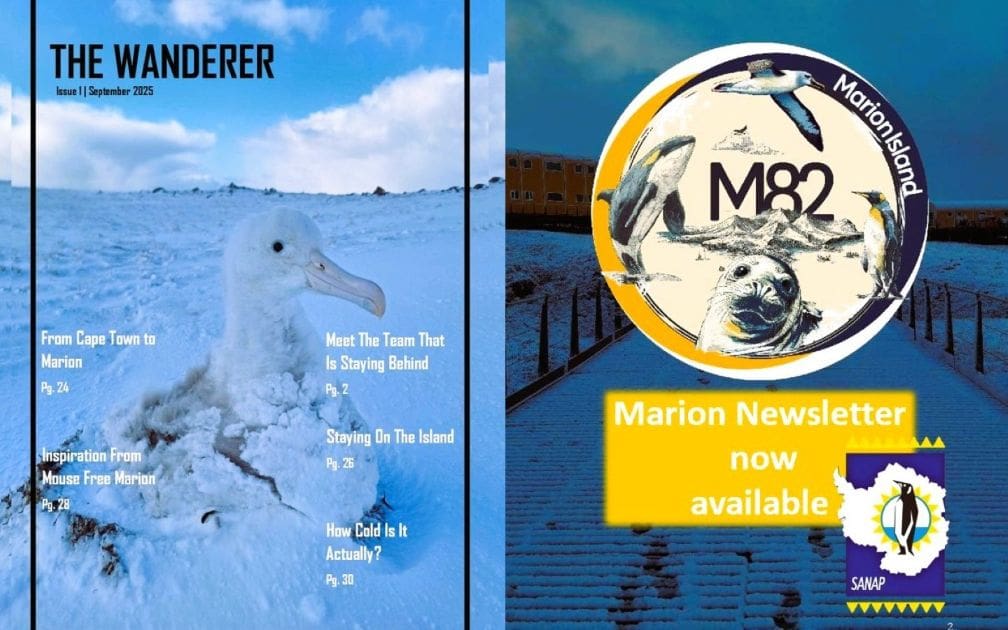
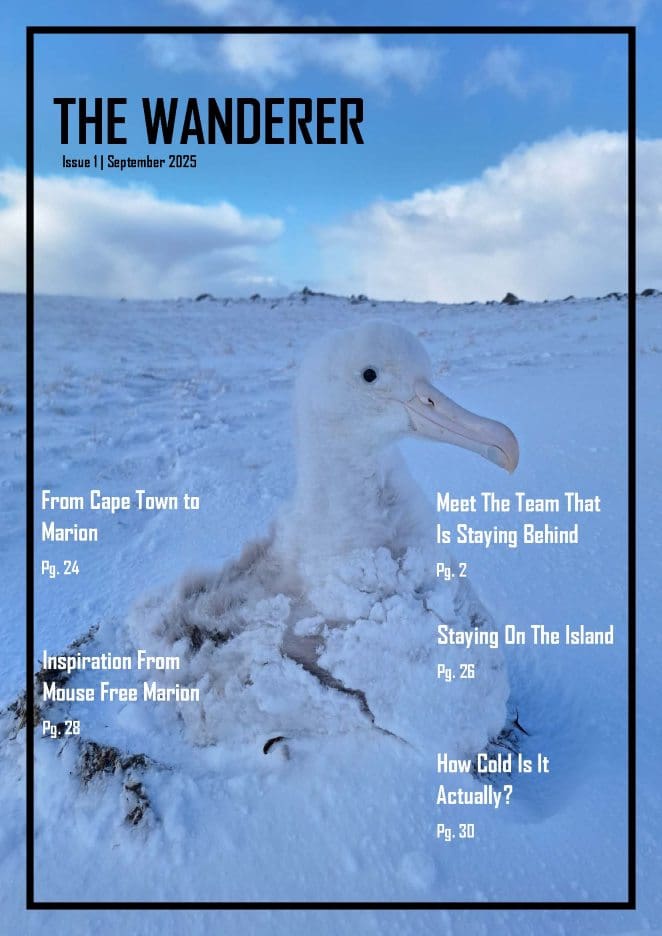 This edition features a warm welcome and introduction from Mndeni Hlatshwayo (Team Leader & Medical Orderly) and Andile Kuzwayo (Editor-in-Chief), followed by a “Meet the Team” section introducing the overwintering members. Richly illustrated with striking photographs, the newsletter also highlights the team’s daily activities, captures the unique island environment, and presents insightful weather statistics that reflect the challenging conditions of Marion Island. Together, these stories offer an engaging look at the people, science, and experiences shaping the Marion 82 overwintering year.
This edition features a warm welcome and introduction from Mndeni Hlatshwayo (Team Leader & Medical Orderly) and Andile Kuzwayo (Editor-in-Chief), followed by a “Meet the Team” section introducing the overwintering members. Richly illustrated with striking photographs, the newsletter also highlights the team’s daily activities, captures the unique island environment, and presents insightful weather statistics that reflect the challenging conditions of Marion Island. Together, these stories offer an engaging look at the people, science, and experiences shaping the Marion 82 overwintering year.

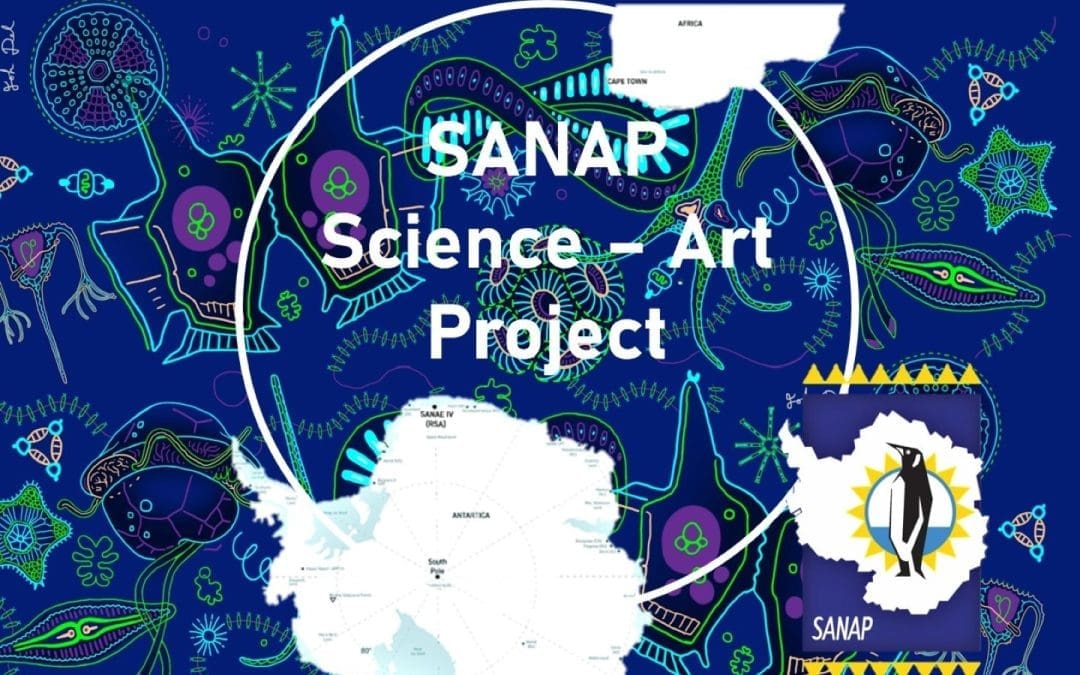
 Drifters: The Invisible Forest: At the heart of the installation is Drifters: The Invisible Forest, a large-scale mural painted by Cape Town artist Joh Del on one of the Sea Point promenade’s ablution blocks. The mural celebrates phytoplankton — microscopic, single-celled organisms that drift through the sunlit surface of the ocean. Though invisible to the naked eye, phytoplankton are foundational to life on Earth. Like plants on land, they photosynthesise, forming the base of marine food webs. They are responsible for producing roughly half of the oxygen we breathe and play a critical role in regulating Earth’s climate by absorbing vast amounts of carbon dioxide through the biological carbon pump. Their seasonal blooms drive ocean productivity, influence global carbon cycles, and ultimately support marine ecosystems and human food security. Structurally diverse and visually striking, phytoplankton are also unexpectedly beautiful. The mural brings this hidden world to life through flowing forms and vivid colour, inviting passers-by to appreciate both the aesthetic wonder and ecological importance of these tiny ocean drifters.
Drifters: The Invisible Forest: At the heart of the installation is Drifters: The Invisible Forest, a large-scale mural painted by Cape Town artist Joh Del on one of the Sea Point promenade’s ablution blocks. The mural celebrates phytoplankton — microscopic, single-celled organisms that drift through the sunlit surface of the ocean. Though invisible to the naked eye, phytoplankton are foundational to life on Earth. Like plants on land, they photosynthesise, forming the base of marine food webs. They are responsible for producing roughly half of the oxygen we breathe and play a critical role in regulating Earth’s climate by absorbing vast amounts of carbon dioxide through the biological carbon pump. Their seasonal blooms drive ocean productivity, influence global carbon cycles, and ultimately support marine ecosystems and human food security. Structurally diverse and visually striking, phytoplankton are also unexpectedly beautiful. The mural brings this hidden world to life through flowing forms and vivid colour, inviting passers-by to appreciate both the aesthetic wonder and ecological importance of these tiny ocean drifters.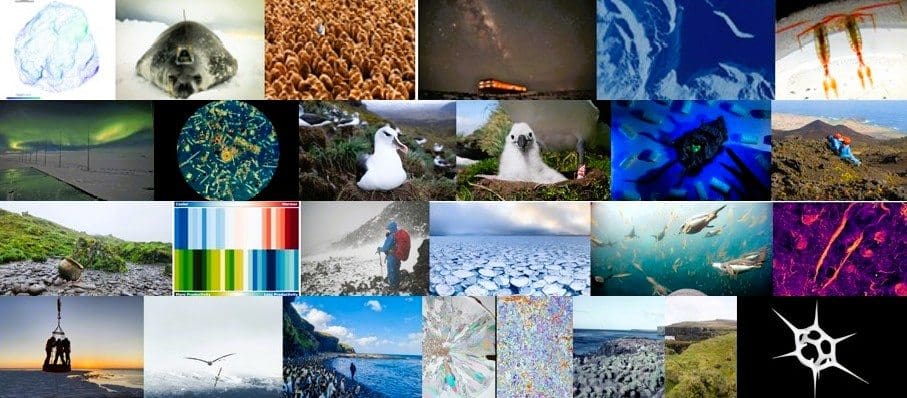 Pole to Promenade: An Outdoor Image Exhibition – Alongside the mural, the Pole to Promenade image exhibition features more than 20 powerful photographs and data visualisations captured by South African polar researchers. These images offer a rare glimpse into the remote and fragile environments of the Southern Ocean and Antarctic region — places central to global climate regulation, yet far removed from daily experience. The exhibition blends field photography, satellite imagery, microscopic views, and creative data visualisations to showcase the breadth of SANAP-supported research. Together, the images highlight South Africa’s long-standing leadership in polar science and underscore the importance of sustained research in understanding climate change, ocean processes, and Earth system dynamics. A huge thank you to all the contributors of these images
Pole to Promenade: An Outdoor Image Exhibition – Alongside the mural, the Pole to Promenade image exhibition features more than 20 powerful photographs and data visualisations captured by South African polar researchers. These images offer a rare glimpse into the remote and fragile environments of the Southern Ocean and Antarctic region — places central to global climate regulation, yet far removed from daily experience. The exhibition blends field photography, satellite imagery, microscopic views, and creative data visualisations to showcase the breadth of SANAP-supported research. Together, the images highlight South Africa’s long-standing leadership in polar science and underscore the importance of sustained research in understanding climate change, ocean processes, and Earth system dynamics. A huge thank you to all the contributors of these images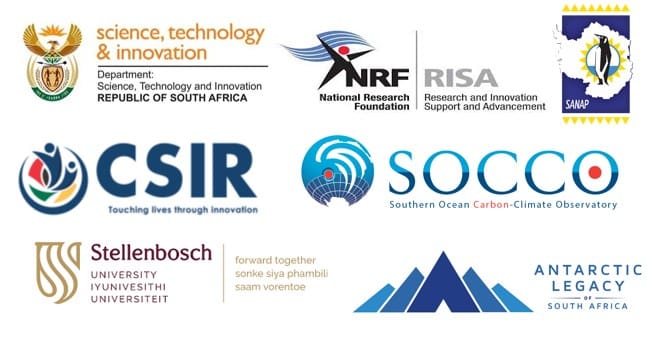
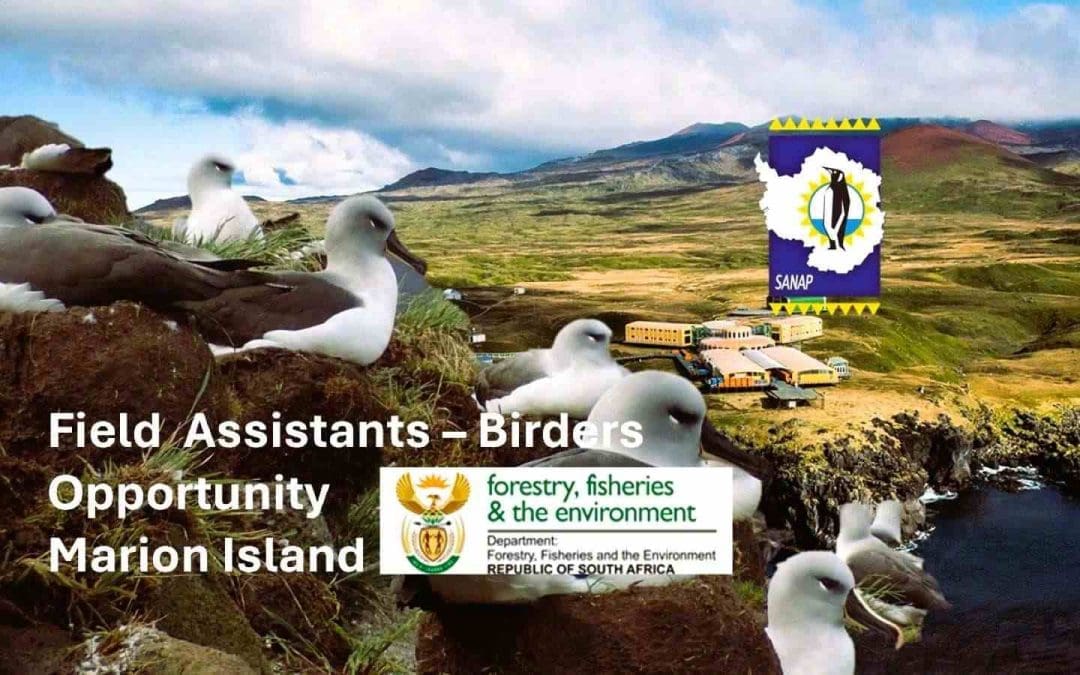
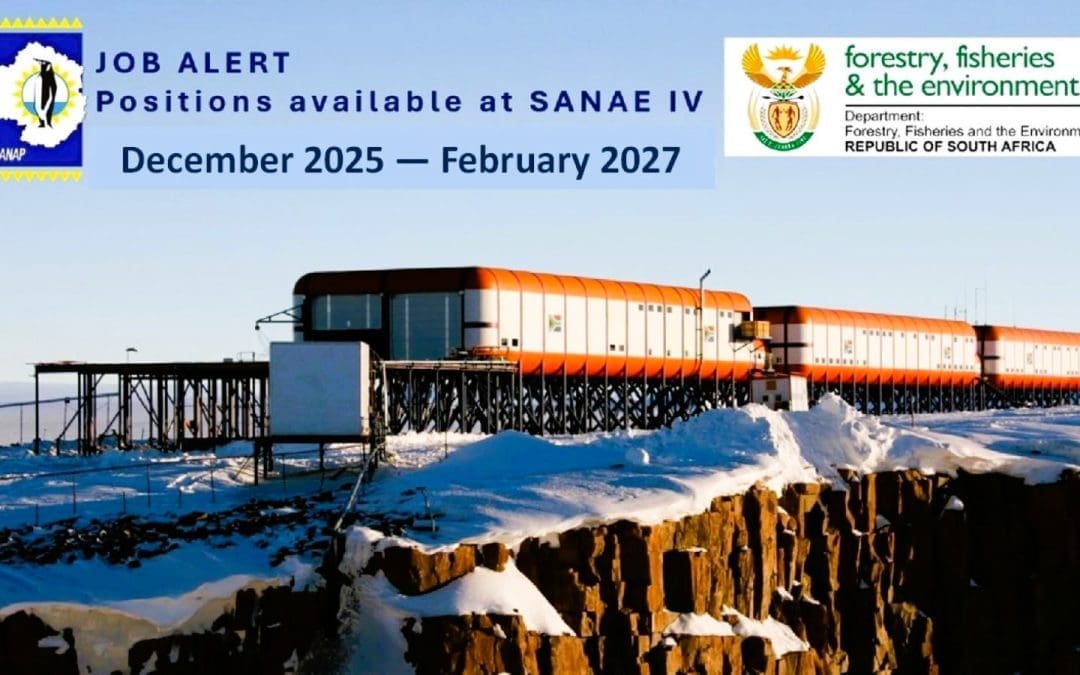
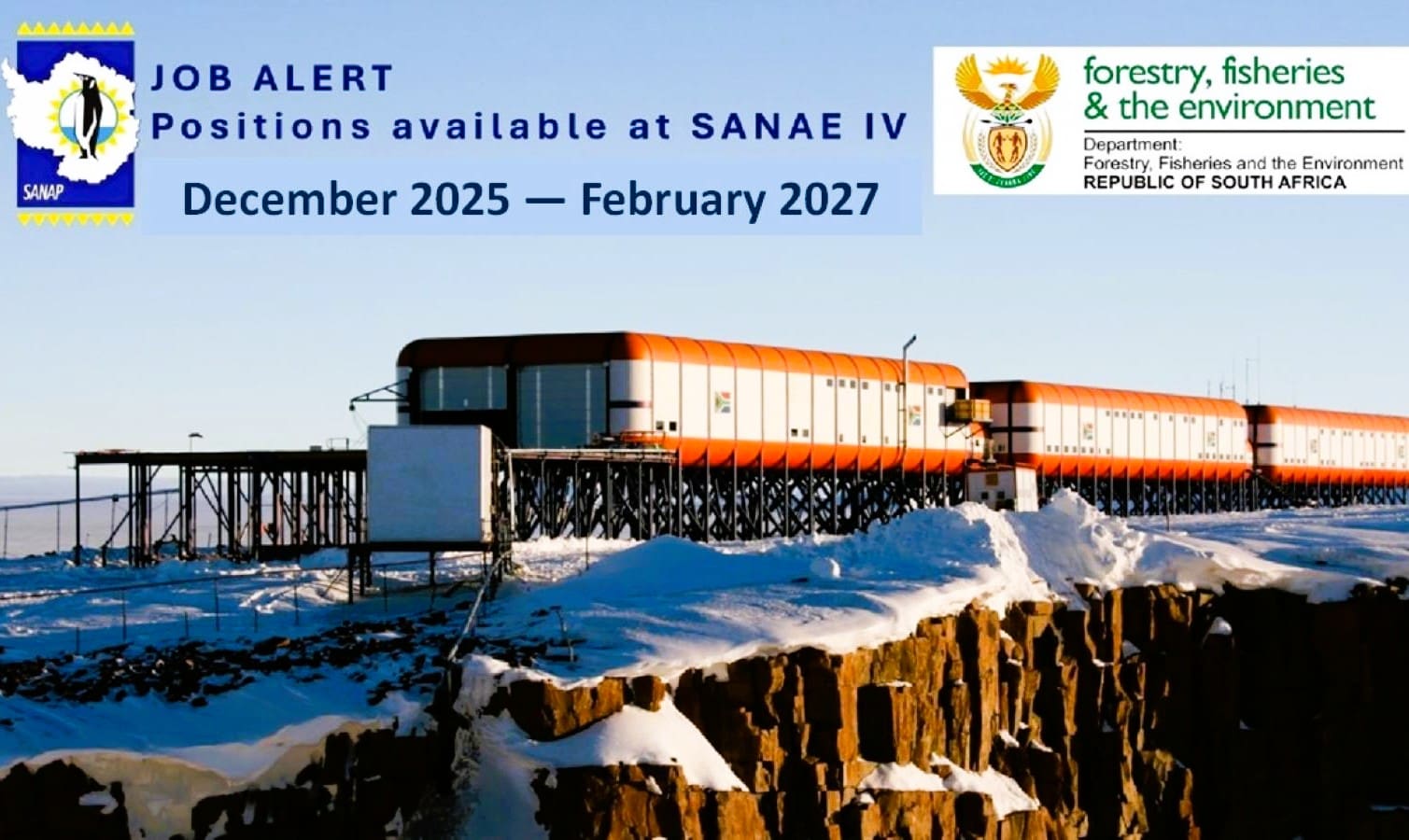 The South African National Antarctic Programme (SANAP) is calling on individuals to apply for positions at the SANAE IV Station in Antarctica for the 2025–2027 overwintering season. This is a rare opportunity to live and work in one of the most remote and extreme environments on Earth, supporting essential scientific research and operations.
The South African National Antarctic Programme (SANAP) is calling on individuals to apply for positions at the SANAE IV Station in Antarctica for the 2025–2027 overwintering season. This is a rare opportunity to live and work in one of the most remote and extreme environments on Earth, supporting essential scientific research and operations.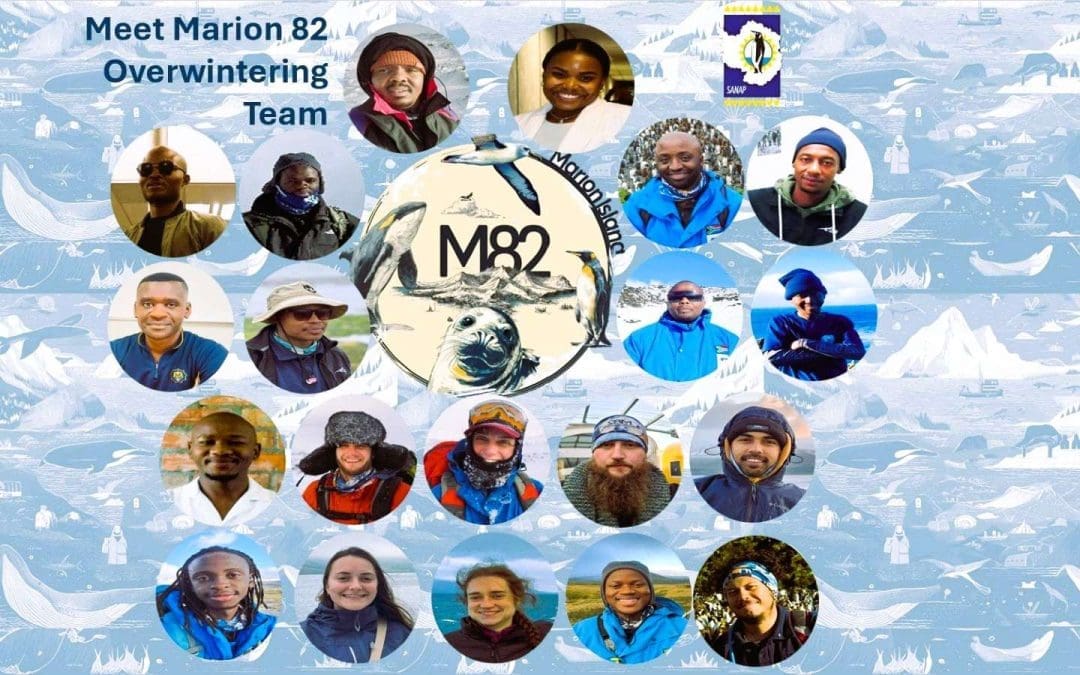

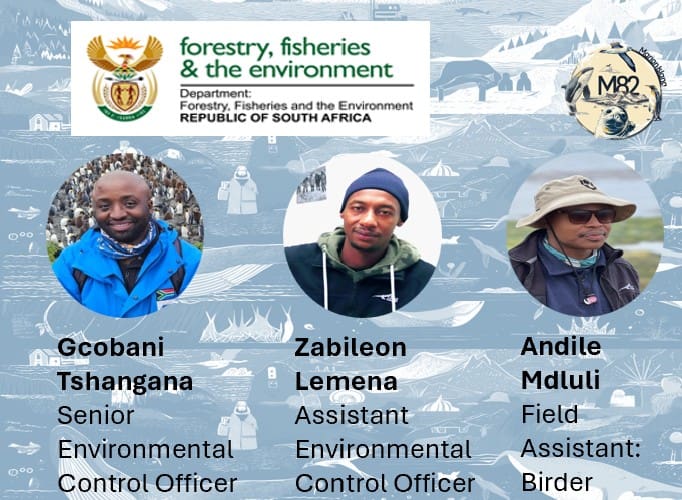
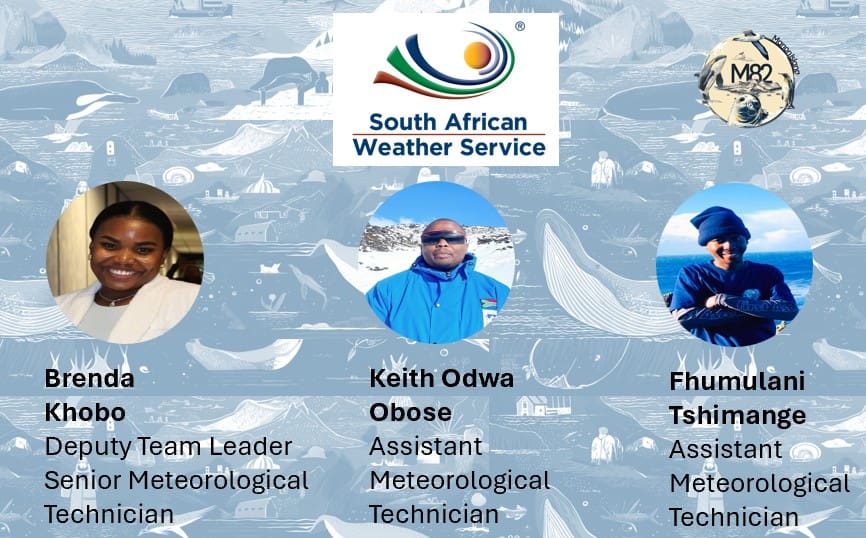
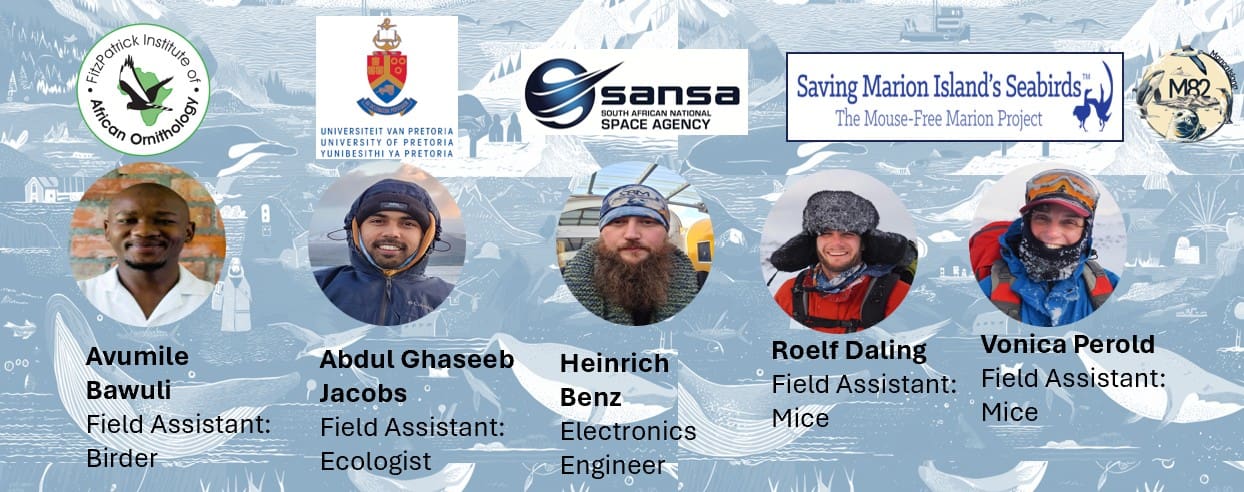
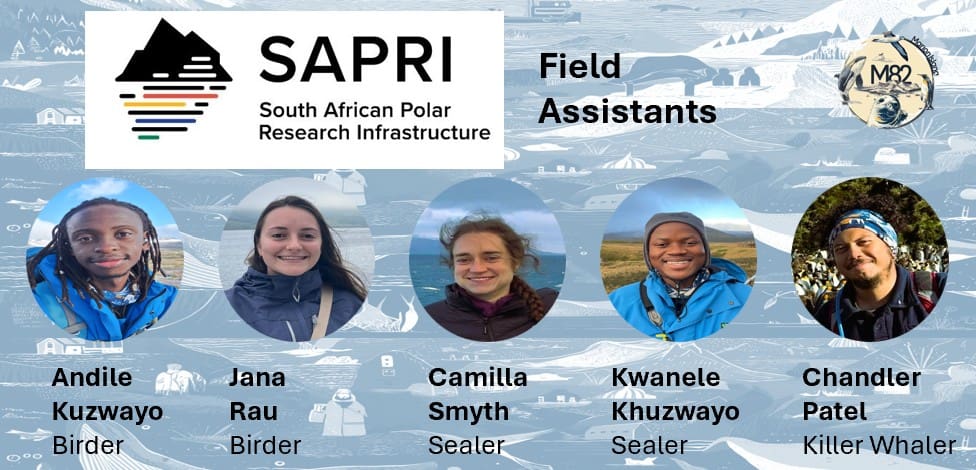
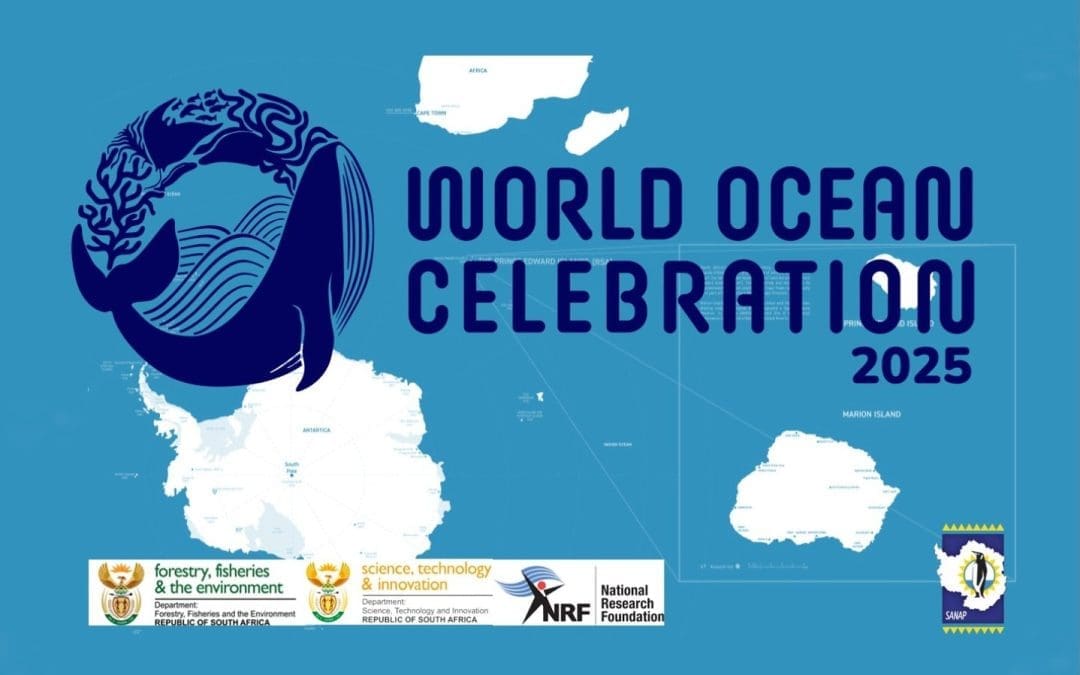
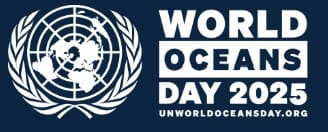 On 8 June 2025, the SANAP community celebrates World Oceans Day under the powerful theme: One Ocean, One Climate, One Future – Together. At the heart of this theme lies a call to protect our blue planet through collective research, and deepened understanding of the critical role our oceans play in shaping the Earth’s climate and supporting life.
On 8 June 2025, the SANAP community celebrates World Oceans Day under the powerful theme: One Ocean, One Climate, One Future – Together. At the heart of this theme lies a call to protect our blue planet through collective research, and deepened understanding of the critical role our oceans play in shaping the Earth’s climate and supporting life.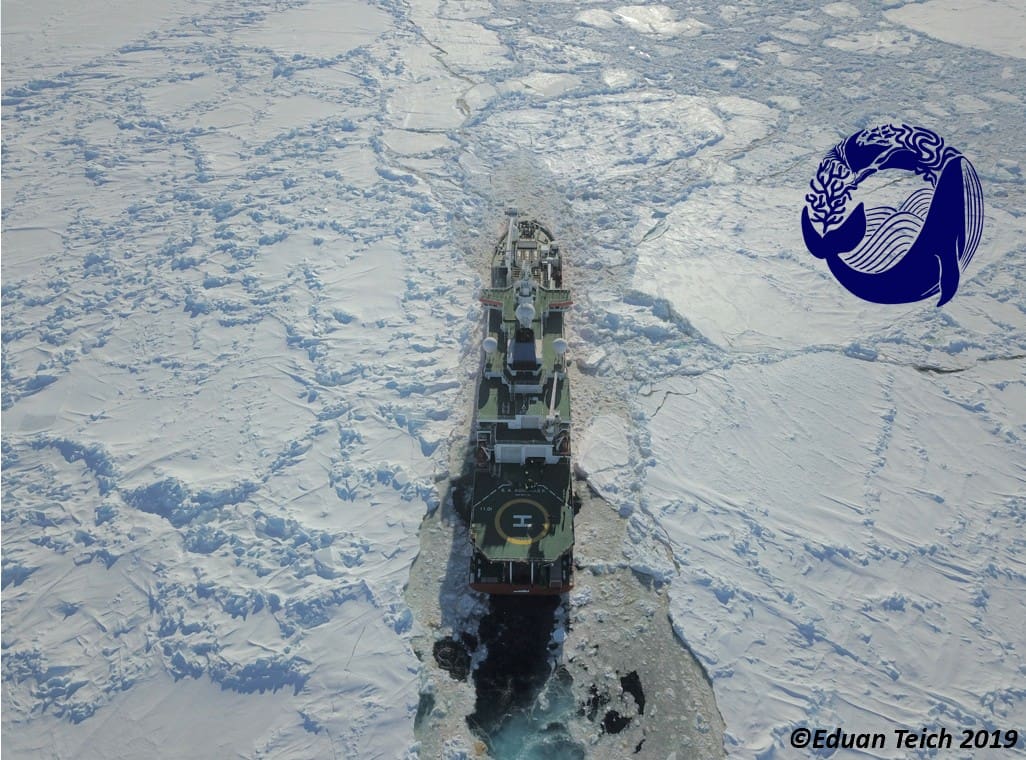 For the South African National Antarctic Programme (SANAP), this is more than a celebration—it’s a reaffirmation of our mission – Understand, Develop and Conserve. Our Southern Ocean research efforts are driven by the urgent need to understand the links between ocean health, climate change, and the wellbeing of future generations. South Africa, as a gateway to Antarctica and the Southern Ocean, plays a key scientific and logistical role in advancing global knowledge of polar and marine systems.
For the South African National Antarctic Programme (SANAP), this is more than a celebration—it’s a reaffirmation of our mission – Understand, Develop and Conserve. Our Southern Ocean research efforts are driven by the urgent need to understand the links between ocean health, climate change, and the wellbeing of future generations. South Africa, as a gateway to Antarctica and the Southern Ocean, plays a key scientific and logistical role in advancing global knowledge of polar and marine systems.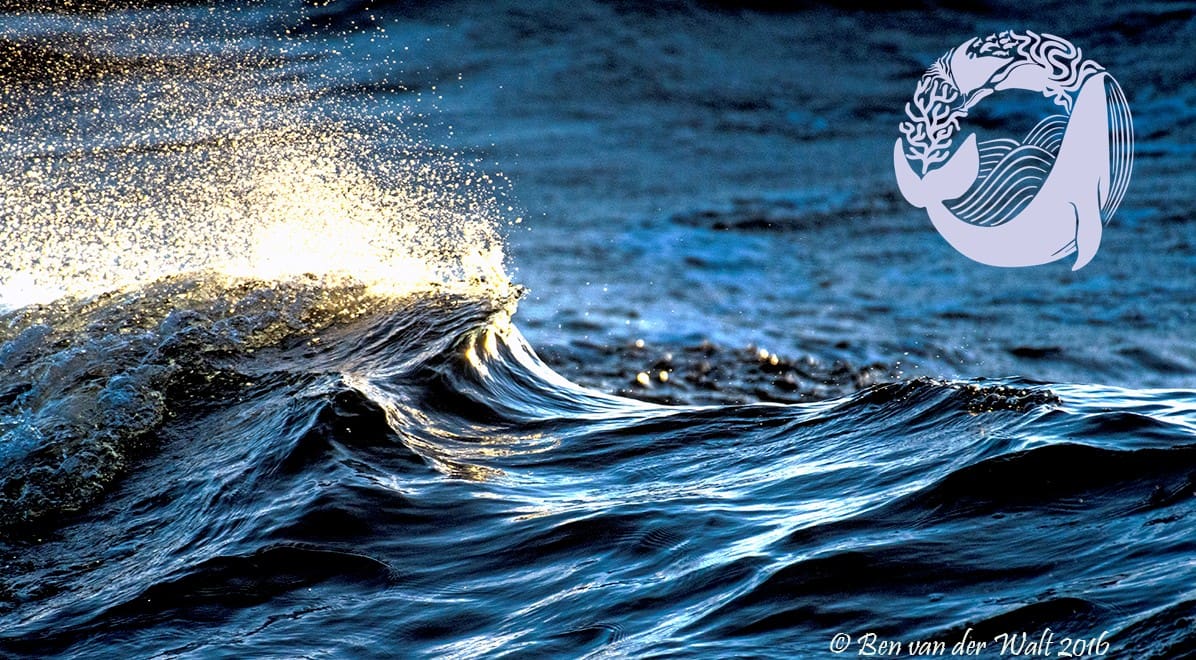 Sometimes called the lungs of the planet, the Southern Ocean absorbs vast amounts of carbon dioxide and heat, making it one of the most crucial regulators of Earth’s climate. It drives ocean circulation, supports unique ecosystems, and connects all major ocean basins. However, it is also one of the fastest-changing regions due to climate change—warming waters, shifting ice dynamics, and altered ecosystems pose challenges that demand urgent scientific attention.
Sometimes called the lungs of the planet, the Southern Ocean absorbs vast amounts of carbon dioxide and heat, making it one of the most crucial regulators of Earth’s climate. It drives ocean circulation, supports unique ecosystems, and connects all major ocean basins. However, it is also one of the fastest-changing regions due to climate change—warming waters, shifting ice dynamics, and altered ecosystems pose challenges that demand urgent scientific attention.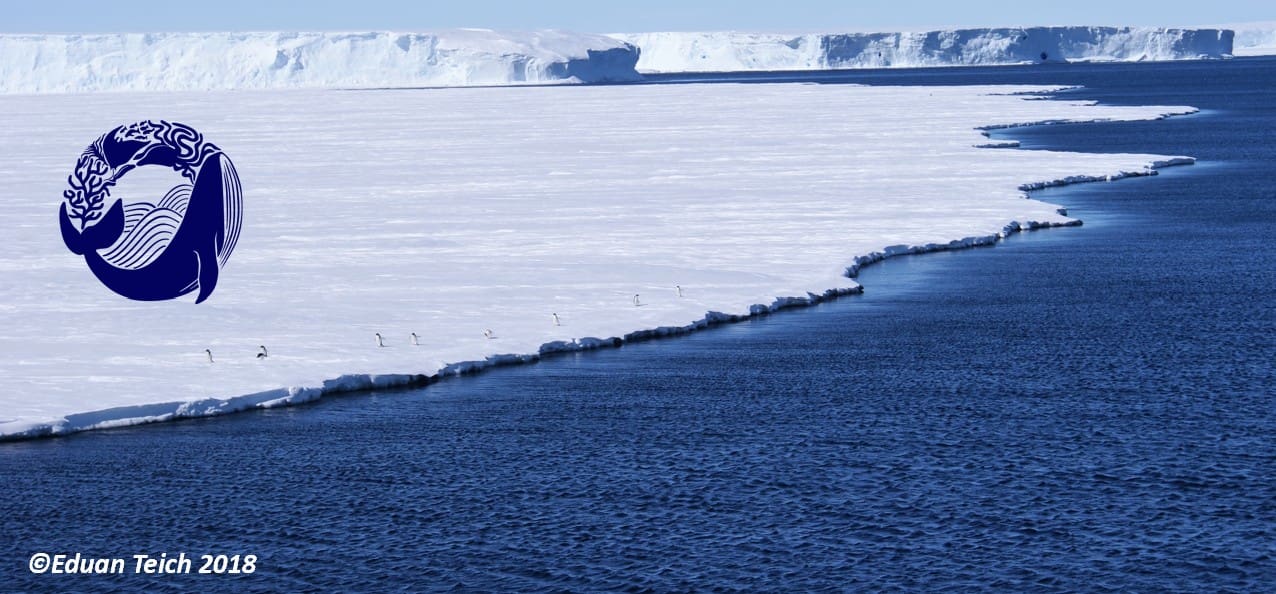 SANAP’s Research Footprint
SANAP’s Research Footprint Through SANAP, South African researchers from various institutions are contributing world-class science to understand and protect the Southern Ocean:
Through SANAP, South African researchers from various institutions are contributing world-class science to understand and protect the Southern Ocean:




